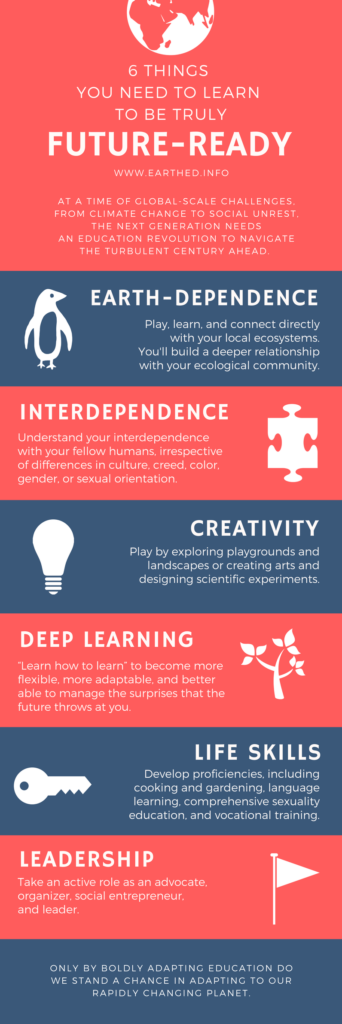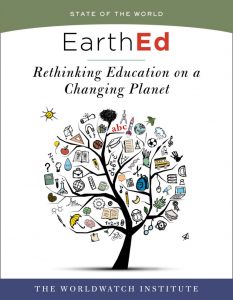This post was originally published by the Worldwatch Institute. The original piece can be found here.
At a time of global-scale challenges, from climate change to social unrest, the next generation needs an education revolution to navigate the turbulent century ahead. Unfortunately, schooling today tends to ignore the massive changes that are looming and offers little training to slow these changes.
The Worldwatch Institute’s EarthEd: Rethinking Education on a Changing Planet shows the path forward for future-ready learning.
“We need to redesign education to teach students to become sustainability champions,” explains Erik Assadourian, EarthEd project director. “Almost as importantly, education must make students more resilient to the changes that are locked into their future — offering a variety of life skills and coping skills.”
Here are Worldwatch’s six steps to creating an education system that is focused on building a sustainable society that is ready to adapt to a changing planet:
1. Instill a sense of Earth-dependence. Teaching students ecoliteracy, the ability to understand the natural systems that make life on Earth possible, is a key piece of the education revolution. But learning about our dependence on the Earth academically is not enough. Children must play, learn, and connect directly with their local ecosystems, cultivating a deeper relationship with the broader ecological community.
2. Teach interdependence. Given that many of the challenges of the future will center on the equitable distribution of increasingly constrained resources and ecosystem services, education must cultivate a deeper understanding of our interdependence with our fellow humans, irrespective of differences in culture, creed, color, gender, or sexual orientation.
3. Cultivate creativity. Because solving the complex challenges ahead will require fresh ideas, education should prioritize creativity. Play, ranging from exploring playgrounds and landscapes to creating arts and designing scientific experiments, is a key element in developing this creativity.
4. Dig into deep learning. “Learning how to learn” makes us more flexible, more adaptable, and thus better able to manage the surprises that the future throws at us.
5. Build life skills. Life skills require a mix of critical thinking, social and emotional intelligence, and creativity. Life skills can include a wide variety of proficiencies, including cooking and gardening, language learning, compreheCulnsive sexuality education, and vocational training.
6. Aim for Earth-centric leadership. Earth-centric leadership is the full actualization of education, of empowering and emboldening students to work energetically to build a sustainable future and to prepare for the difficult transitions ahead. Schools can teach students to take active roles as advocates, organizers, social entrepreneurs, and leaders of all types.

Gaelle Gourmelon is the Director of Communications and Marketing at the Worldwatch Institute.
More About EarthEd
With global environmental changes locked into our future, what we teach must evolve.
Worldwatch’s EarthEd, with contributions from 63 authors, includes chapters on traditional environmental education topics, such as ecoliteracy, nature-based learning, and systems thinking, as well as expanding the conversation to new topics essential for Earth education, such as character education, social emotional learning, the importance of play, and comprehensive sex education.
Ultimately, only by boldly adapting education do we stand a chance in adapting to our rapidly changing planet.
On Wednesday, August 2, 2017 from 10:15 to 11:45 AM (Pacific Daylight Time) EarthEd contributors Erik Assadourian, Melissa K. Nelson, and Joslyn Rose Trivett will be joining Island Press to discuss EarthEd on the Security and Sustainability Forum’s Science Literacy Webinar Series. This is a free webinar, which you can register for here.
This post was originally published by the Worldwatch Institute. The original piece can be found here.
The MAHB Blog is a venture of the Millennium Alliance for Humanity and the Biosphere. Questions should be directed to joan@mahbonline.org
The views and opinions expressed through the MAHB Website are those of the contributing authors and do not necessarily reflect an official position of the MAHB. The MAHB aims to share a range of perspectives and welcomes the discussions that they prompt.

